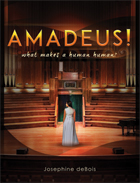
 |
Ludwig Mann is a conductor riding the heights of fame and execution in his profession. Organizing orchestras in sell-out live performances and selling popular recordings around the world, life seems to be in the palm of his hand. Still, he is plagued with insecurities and doubt about his work, his life, and his romance. On the one hand is Tiffany Yun, a talented pianist whom he has bound his existence to despite fate and culture keeping them apart. On the other is Josephine deBois, his manager, who has been with him every step of the way and is deeply committed to him. The pressures of being a celebrity and always in demand compound this unsure aspect of his nature, but a deeper, darker secret is hidden from even Ludwig himself.
The reality is that Ludwig is the result of the ultimate experiment, one that serves to prove or disprove that humanity is what it is because of the existence of a soul or some mystical providence. Synthetically created by advanced scientists and backed by powerful church figures, Ludwig is the answer to the question of what makes human beings unique. His creative ability and the romance surrounding him are viewed ultimately as a success by the scientists responsible for him but as blasphemy to their holy benefactors. Desperate to strike all evidence of this disastrous outcome before it can be made public, Ludwig and the people close to him feel the tightening of the conspiracy around them and must fight for their survival as they also develop their own answers to the all-important question of humanity.
Written in a screenplay style and format, many of the scenes that occur in this story come to life with stage direction, film transitions, and the clever use of a soundtrack—all described by the author in between dialogue and exposition. This choice allows the reader to be “ground-level” with the characters, often spending as much time with their feelings and their day-to-day concerns than with the grand conspiracy hanging over the narrative. Indeed, it takes time for this to be revealed to the audience aside from a foreboding introduction, creating a storytelling environment that is often surprising and thrilling to unpack and unfold. Mysterious aspects of characters and unexplained events take their time to rise to the surface, framed initially in a romantic and melodramatic love triangle playing out around Ludwig.
That choice is an intelligent narrative touch that prevents this from being another science fiction story bogged down in the how and instead presents itself as a more human drama about the who and why. There is definitely plenty of both to satisfy readers of either genre, but the focus on what the existence of a synthetically created human being would do to the psyche of the world as well as the people involved in his creation and life asks a lot of fascinating questions and gives them to the reader to consider as well. The read itself is brisk, stylish, full of high society living and all of the flourishes of cinematic post-production, such as the cinematography and musical backing integrated directly into the story itself. Just like the unlikely marriage of the conspirators coming from both the scientific and religious communities, this story intersects art and science, facts and feelings in a way that excites all of the senses.